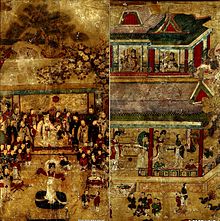Mu (Zhou King)
Mu , King of Zhou ( Chinese : 周 穆王; Pinyin : Zhōu Mù Wáng) was the fifth king of the Chinese Zhou Dynasty ( Western Zhou Dynasty ). He ruled from 956 BC. BC to 918 BC Chr.
Life
Mu, whose personal name was Man (滿, mǎn), came to the throne after his father and predecessor Zhao was killed in the war against Chu . After the severe defeat of the House of Zhou, Mu introduced some changes. For the first time high offices were given to people who were not obviously related to the king, which is why Mu is associated with the beginning of the bureaucratic mode of government. The military was reformed and professionalized. Mu is also credited with the first systematic code of law. The ritual shook off elements of the Shang Dynasty during Mus's reign ; Based on the found ritual bronzes , a transition from private ceremonies in family circles to rituals performed by specialists in front of a large audience can be traced.
For the 12th and 13th year of King Mu's reign, the bamboo annals tell of a war against the Xurong , a people who probably lived in what is now Jiangsu . Xurong, which had formed an alliance with 36 smaller states in eastern China, attacked the Zhou heartland from the east, first Chengzhou , then even Zongzhou . House of Zhou successfully defended themselves and defeated the Xurong.
During the reign of King Mu, the feudal states that King Cheng had given to his close relatives were already the third generation of the respective ruling clans. The bond with the house of Zhou and the original home in the valley of the Wei River decreased, so that the king could no longer rely on the personal relationships or the family relationship. In the end, he had to actually recognize the independence of the feudal states.
The living of a long-distance relationship with the Queen Mother of the West grows around King Mu . His alleged trip to the West, where he wanted to visit the Queen Mother, was romanticized in the 4th century in the work History of the Son of Heaven Mu (穆天子 傳, Mù Tiānzǐ Zhuàn). Although the work is fictional , it shows the interaction of the Zhou Empire at the time of King Mu with its neighbors in the north: Objects made of gold and silver as well as grain were traded and animals, especially horses, were given in return. Finds from graves in what is now northern China prove this information.
family
|
King Zhao of Zhou 周昭 王 |
? | ||||||||||||||||
|
King Mu of Zhou 周 穆王 |
? | ||||||||||||||||
|
King Gong of Zhou 周 共 王 |
King Xiao of Zhou 周孝王 |
||||||||||||||||
Individual evidence
- ^ Edward L. Shaughnessy : Calendar and Chronology . In: Michael Loewe and Edward L. Shaughnessy (Eds.): The Cambridge History of Ancient China . Cambridge University Press, 1999, ISBN 978-0-521-47030-8 , pp. 25 .
- ^ Edward L. Shaughnessy: Western Zhou History . In: Michael Loewe and Edward L. Shaughnessy (Eds.): The Cambridge History of Ancient China . Cambridge University Press, 1999, ISBN 978-0-521-47030-8 , pp. 293 .
- ^ Edward L. Shaughnessy: Western Zhou History . In: Michael Loewe and Edward L. Shaughnessy (Eds.): The Cambridge History of Ancient China . Cambridge University Press, 1999, ISBN 978-0-521-47030-8 , pp. 326 .
- ^ Edward L. Shaughnessy: Western Zhou History . In: Michael Loewe and Edward L. Shaughnessy (Eds.): The Cambridge History of Ancient China . Cambridge University Press, 1999, ISBN 978-0-521-47030-8 , pp. 332 .
- ^ Edward L. Shaughnessy: Western Zhou History . In: Michael Loewe and Edward L. Shaughnessy (Eds.): The Cambridge History of Ancient China . Cambridge University Press, 1999, ISBN 978-0-521-47030-8 , pp. 323 .
- ^ Edward L. Shaughnessy: Western Zhou History . In: Michael Loewe and Edward L. Shaughnessy (Eds.): The Cambridge History of Ancient China . Cambridge University Press, 1999, ISBN 978-0-521-47030-8 , pp. 324 .
- ^ Nicola di Cosmo : The Northern Frontier in Pre-imperial China . In: Michael Loewe and Edward L. Shaughnessy (Eds.): The Cambridge History of Ancient China . Cambridge University Press, 1999, ISBN 978-0-521-47030-8 , pp. 921 .
- ^ Nicola di Cosmo : The Northern Frontier in Pre-imperial China . In: Michael Loewe and Edward L. Shaughnessy (Eds.): The Cambridge History of Ancient China . Cambridge University Press, 1999, ISBN 978-0-521-47030-8 , pp. 962 .
- ^ Nicola di Cosmo : The Northern Frontier in Pre-imperial China . In: Michael Loewe and Edward L. Shaughnessy (Eds.): The Cambridge History of Ancient China . Cambridge University Press, 1999, ISBN 978-0-521-47030-8 , pp. 964 .
| predecessor | Office | successor |
|---|---|---|
| Zhao |
King of China 956 BC BC – 918 BC Chr. |
gong |
| personal data | |
|---|---|
| SURNAME | Mu |
| ALTERNATIVE NAMES | 周 穆王 (Chinese); Zhōu Mù Wáng |
| BRIEF DESCRIPTION | chinese king |
| DATE OF BIRTH | 11th century BC BC or 10th century BC Chr. |
| DATE OF DEATH | 918 BC Chr. |

